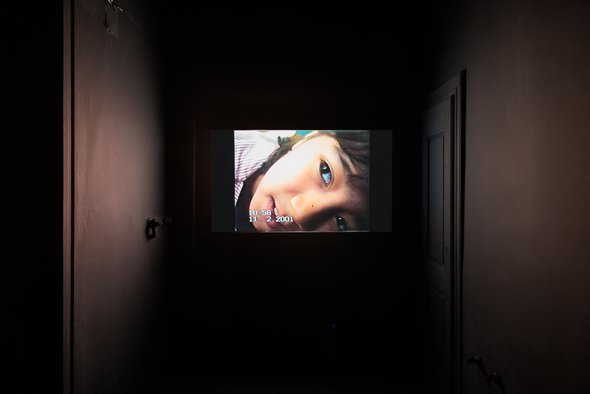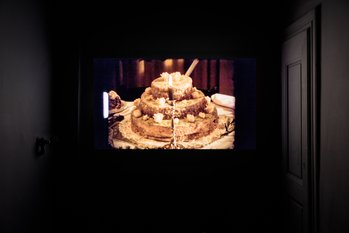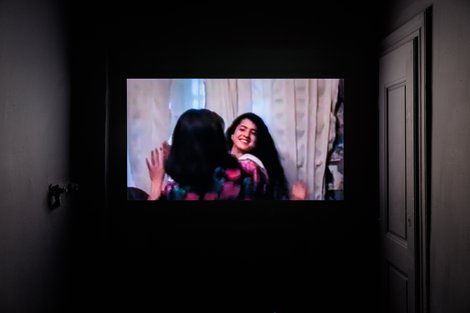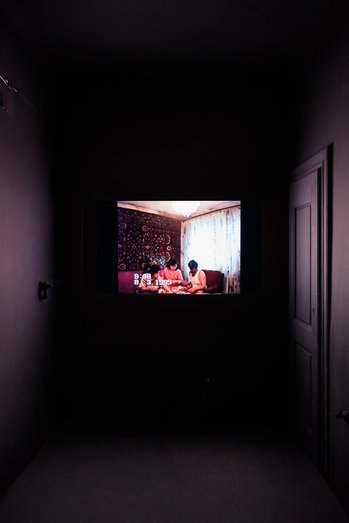HAZM KARDAN DUSHVOR AST / KINO MANHATTAN
Nazira Karimi
Nazira Karimi
KINO MANHATTAN is pleased to present Hazm Kardan Dushvor Ast, a video work by Nazira Karimi and the first in a series of three screenings by the artist that will run concurrently with the exhibitions Chapter 1. Concealment, Chapter 2. Refusal and Chapter 3. Doubling.
Hazm Kardan Dushvor Ast (Hard to Digest) is a short film that weaves together family archive footage of women in the filmmaker’s family with the filmmaker herself sharing a recipe for her cultural food in her broken German language. Through the lens of food and language, the film delves into the intersection of personal history and cultural identity.
Plov is a rice dish from Central Asia, made with shredded yellow turnip or carrot, and pieces of meat. Everything is fried together in vegetable oil or mutton fat in a kazon, a special wok-shaped cauldron, over an open flame. The meat is cubed, carrots are chopped finely into long strips, and the rice is coloured yellow or orange by frying the carrots in oil. The dish is eaten communally from a single large plate placed at the centre of the table, traditionally with one’s hands.
Hazm Kardan Dushvor Ast (Hard to Digest) is a short film that weaves together family archive footage of women in the filmmaker’s family with the filmmaker herself sharing a recipe for her cultural food in her broken German language. Through the lens of food and language, the film delves into the intersection of personal history and cultural identity.
Plov is a rice dish from Central Asia, made with shredded yellow turnip or carrot, and pieces of meat. Everything is fried together in vegetable oil or mutton fat in a kazon, a special wok-shaped cauldron, over an open flame. The meat is cubed, carrots are chopped finely into long strips, and the rice is coloured yellow or orange by frying the carrots in oil. The dish is eaten communally from a single large plate placed at the centre of the table, traditionally with one’s hands.
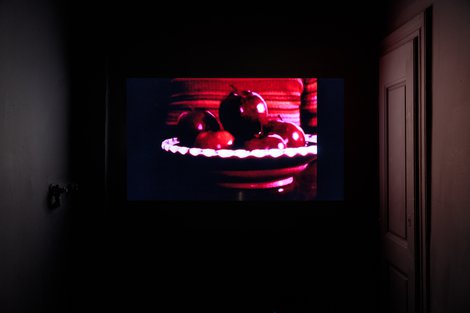
6.03.24—13.04.24
GIANNI MANHATTAN, Wassergasse 14, 1030 Vienna
> Installation views
KINO MANHATTAN is pleased to present Hazm Kardan Dushvor Ast, a video work by Nazira Karimi and the first in a series of three screenings by the artist that will run concurrently with the exhibitions Chapter 1. Concealment, Chapter 2. Refusal and Chapter 3. Doubling.
Hazm Kardan Dushvor Ast (Hard to Digest) is a short film that weaves together family archive footage of women in the filmmaker’s family with the filmmaker herself sharing a recipe for her cultural food in her broken German language. Through the lens of food and language, the film delves into the intersection of personal history and cultural identity.
Plov is a rice dish from Central Asia, made with shredded yellow turnip or carrot, and pieces of meat. Everything is fried together in vegetable oil or mutton fat in a kazon, a special wok-shaped cauldron, over an open flame. The meat is cubed, carrots are chopped finely into long strips, and the rice is coloured yellow or orange by frying the carrots in oil. The dish is eaten communally from a single large plate placed at the centre of the table, traditionally with one’s hands.
Hazm Kardan Dushvor Ast (Hard to Digest) is a short film that weaves together family archive footage of women in the filmmaker’s family with the filmmaker herself sharing a recipe for her cultural food in her broken German language. Through the lens of food and language, the film delves into the intersection of personal history and cultural identity.
Plov is a rice dish from Central Asia, made with shredded yellow turnip or carrot, and pieces of meat. Everything is fried together in vegetable oil or mutton fat in a kazon, a special wok-shaped cauldron, over an open flame. The meat is cubed, carrots are chopped finely into long strips, and the rice is coloured yellow or orange by frying the carrots in oil. The dish is eaten communally from a single large plate placed at the centre of the table, traditionally with one’s hands.
Nazira Karimi, (b. 1996 in Dushanbe, Tajikistan; lives and works in Vienna, Austria and Almaty, Kazakhstan) is an artist and filmmaker whose work explores themes of memory, identity, and the environment, with a particular focus on the ongoing impacts of colonization in Central Asia. Karimi’s artistic practice spans multiple mediums, including film, photography, and installations. In addition to her artistic pursuits, she has also been involved in various activism and community-building projects. Karimi is a co-founder of the platform Ruyò and a member of MATA and DAVRA collectives. Her involvement in all-female artist collectives reflects her commitment to creating spaces for underrepresented voices and perspectives in the art world.
